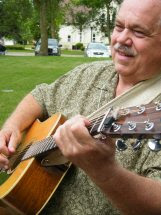- RAMBLING BLUES: THE LIFE & SONGS OF CHARLIE POOLE
by Kinney Rorrer - Ultimate biography of one of old-time country music's most influential songsters. Includes many photos, interviews with folks who knew him and complete words and sources for the songs he recorded, plus an extensive discography
The book was first published in 1982 and the author was able to talk to some of the people who knew Charlie Poole (he died in 1931 at the age of 39). The first part of the book sketches in his early life and direct accounts are few; however, there are descriptions of the development of the textile industry in North Carolina (Charlie's family were mill workers) as well as descriptions of the area's musical environment.
In the 'company' town in which Charlie nominally lived for the last thirteen years of his life (he was a Rambler, after all), the Mill helped fund and support several musicians to give lessons and hold musical festivals and so forth. The town had at most 2,000 folk, so I was impressed that there were hundreds of people in the music classes; and that they held festivals lasting a week or more. A book on the neurosicence of music that I recently read stated that currently only 7% of the population had played a musical instrument in the past year. Even though a lot of these folk spent 60 hours a week working at the mills, this amount of participation means that there were worthwhile things to do before TV gobbled up an average of 4 hours 35 minutes of TV every day. Of course as I've mentioned in previous blogs, many contemporary old time musicians have stated on stage that they don't own a TV (OK - I've heard two musicians say it).
The other insight gained from this part of the book is how varied a musical culture actually existed for musicians such as Charlie Poole. One of the music teachers was a German classically trained fiddler who judged the 'old-time' fiddle and banjo contest. In addition to 'string bands', there were also dixieland and brass bands.
So far, a fascinating book.

No comments:
Post a Comment